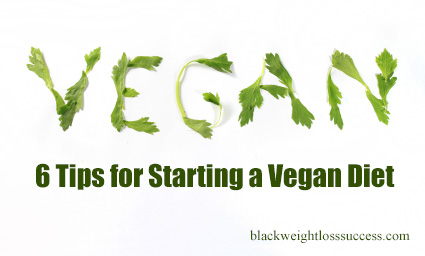If you have decided to start a vegan diet then you are in good company. Many people are adopting the vegan lifestyle for health and ethical reasons. Here are 6 tips for starting a vegan diet to help you get the most benefit from your choice.
 Tip #1 – Plan meals ahead of time
Tip #1 – Plan meals ahead of time
Keeping a vegan diet takes effort. By the middle of the work week, you may not be up to the effort anymore and it becomes easier to make the wrong choices. You can prevent this by planning out your meals ahead of time and organizing your food so grabbing the right thing to eat is easy. Also, always make sure to have a snack with you of fruit, nuts or whole grains to help tide you over when hunger strikes.
Tip #2 – Up your B12
Vegans have a smaller percentage of B12 deficiencies than vegetarians; possibly because of the dietary on green, leafy vegetables but even being low on B12 can seriously impact your health. B12 is a soluble vitamin, which means our bodies do not store it. What is not immediately used is filtered out. It is essential that you add a B12 supplement to your diet to avoid developing a deficiency in this vitamin. A B12 deficiency can cause serious problems and even lead to thinking disorders, neurological problems, mood disorders and fatigue.
Tip #3 – Don’t assume meatless means healthy
Many vegans assume that if there is no meat in a dish, then the dish must be healthy. A lack of animal or fish protein in a dish doesn’t imply a healthier food; it just means that something else has been used to supply the body with something that will be taken in as filling. In many instances, bleached flour, trans fats, other benefit-less fillers are used to create a dish that is filling, but has little nutritional value. Always make sure to know what is in the dish and to make sure that the rest of your plate has a balanced serving of other foods to maintain a healthy diet. Read food labels and do research online.
Tip #4 – Be consumer smart
Being vegan isn’t just a healthier choice for many; it is also a booming marketing demographic for food and clothing producers. The label of ‘vegan’ attached to any item often comes with an associated higher price than its non-vegan counterpart. As a smart consumer, it is important that you remember that there are no regulations about who can and cannot use the term vegan on a label. Only recently have food packaging laws been changed to clearly define what can be labeled organic and many people are shocked to discover what they though was a healthy and organic product, only contained one organic ingredient amid many chemicals, steroid and genetically altered ingredients. Be careful when buying that you don’t believe the hype. Take the time to read all of the ingredients and do your homework.
Tip #5 – Look at restaurant menus before you go out
More and more restaurants are accommodating vegetarians, vegans and those with gluten intolerance. While some restaurants will highlight on the menu which dishes are prepared to common vegan standards, some will only list this information online. Planning ahead for what you are going to order before you get to the restaurant has more benefits than just allowing you to stick to your dietary guidelines. If you already know what you can and cannot eat and have an idea of what you will order, it can make dining out more comfortable with friends and family who may not completely understand the vegan restrictions.
Tip #6 – Find vegan sources of protein and calcium
Many of the studies done on the impact of a vegan diet on health have reported low bone density in long term vegans and a protein deficiency in the diet. This has been attributed to a commiserate low calcium intake. Protein deficiencies in the diet can contribute to lethargy, depression and other issues. This doesn’t mean that a vegan diet promotes these deficiencies; it does mean that many vegans are not following a diet that provides for vegan sources of adequate amounts of protein and calcium. Some common sources of calcium include green leafy vegetables; calcium fortified or set soy products, beans, fruits and grains. You can find protein in things like faux meats, soy, nuts, leafy greens, beans and vegan protein powders. The recommended daily allowance of calcium for an adult is set at 1000 mcg a day. Protein needs will vary according to the individual.

Comment Via Facebook